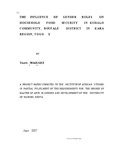| dc.description.abstract | The question of food security has become a crucial one, because all development initiatives depend on how healthier people are to undertake them. This calls for more research to investigate how food security can be improved at the household level. This study was carried out in Kuhalo community, Boufale District; on the influence of gender roles on household food security. The study sought to investigate motives and conditions that influence gender roles vis-a-vis the control and management of the means and goods of production in Kuhalo community and how it impacts on household food security. Specifically, the study aimed at determining the gender division of labour in food production and its management in Kuhalo community; describing and analyzing the social, economic and cultural factors influencing household food security in Kuhalo community and examining the coping mechanisms adopted by both genders, to counter food security problems facing their households in Kuhalo community.
The research is conducted in the Kuhalo community, in Binah prefecture in the North of Togo. The study subjects mainly included married men and women, widowers and widows as well as single and divorced parents of 100 households sampled from three selected villages. The data collected is about individuals in households, but the household is the unit of analysis because it is the decision-making unit. Personal interviews were used as the principal method of data collection to obtain data on socio-cultural factors affecting household food security such as beliefs, attitudes, values, perceptions as well as marital status, religious backgrounds and education levels that influence the control and management of means and goods of production. Direct observation method was useful in capturing information on food production and management during social events. Focus Group Discussions method was used with the aim of exploring further, the various issues on the influence of gender roles within the household. Key informants, who are not members of Kuhalo community, were also interviewed. The data was analyzed using both qualitative and quantitative approaches and findings were presented using percentages, frequencies and tables.
YIll
The major findings of the study revealed that in Boufale District, people produce diversified food crops such as yams, maize, sorghum, beans, rice and millet but decisions making over resources allocation for food crops production and management, are mostly made by men. During the production cycle, women have to negotiate for land from their husbands or relatives and have to borrow the means of production which limit their productive ability. Cultural ceremonies contribute to food shortages that people of Kuhalo community face as individuals and communities. Coping mechanisms to counter food problems were found to affecting household food security in Kuhalo community. Moreover, the social structures encourage women to look at men (their husbands) as the heads of their households. Findings proved that men and women are living in unbalanced power relationships which affect their households' food security.
On the basis of the study findings, it was concluded that the key factor of women's subordination to men lies in the historical background and patrilineal system of food production and management, where only men are seen as bread winners for their households. And therefore, all the activities that women performed were not accounted for as contributing to secure food for their households. During the times of food shortages and hunger, women perform better than men in carrying out income generating activities towards meeting household subsistence needs. Such gender roles biases have affected household food security.
It was therefore, recommended to introduce development programmes of creating gender awareness among the population of the Kuhalo community to help advance women ability in food production to improve their households living conditions. Togolese authorities and development Organizations in the region should technically assist to sensitize people of Kuhalo community about the effects of gender roles on household food security if meaningful contributions are to be realized in the food security arena. This research therefore, can serve as a working paper for establishing gender programmes in the study area and as a basis for formulating a broad societal awareness campaigns on the influence of gender roles on household food security . | en |

